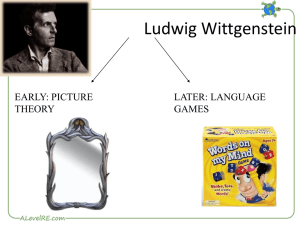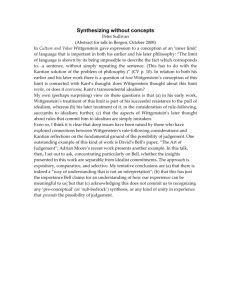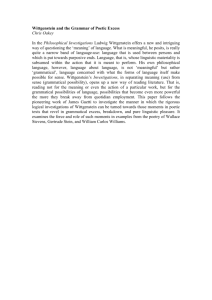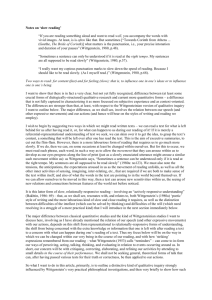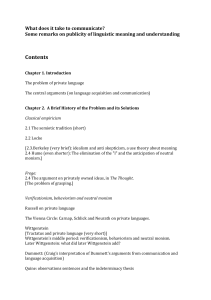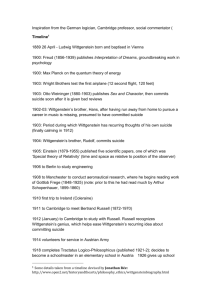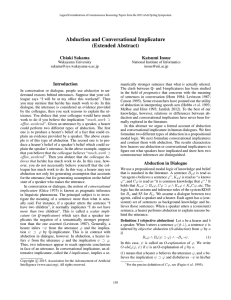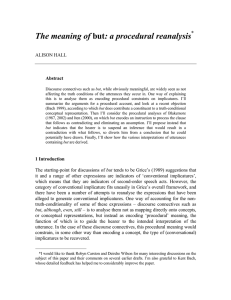This, you might think, is one of the simplest examples of a valid
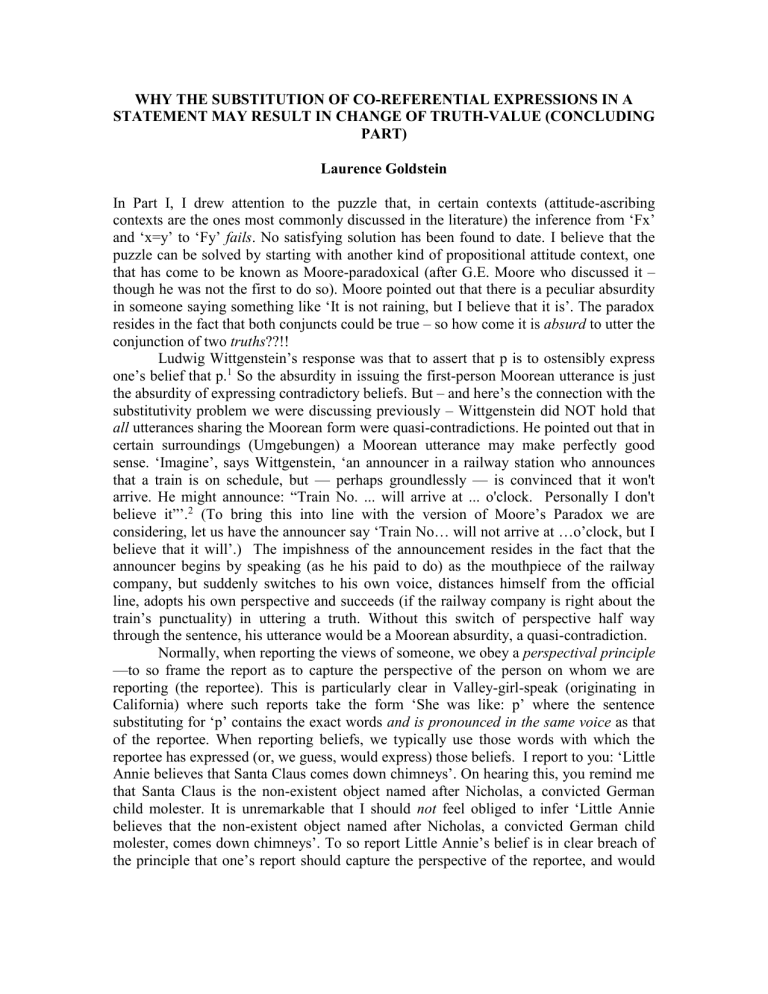
WHY THE SUBSTITUTION OF CO-REFERENTIAL EXPRESSIONS IN A
STATEMENT MAY RESULT IN CHANGE OF TRUTH-VALUE (CONCLUDING
PART)
Laurence Goldstein
In Part I, I drew attention to the puzzle that, in certain contexts (attitude-ascribing contexts are the ones most commonly discussed in the literature) the inference from ‘Fx’ and ‘x=y’ to ‘Fy’ fails . No satisfying solution has been found to date. I believe that the puzzle can be solved by starting with another kind of propositional attitude context, one that has come to be known as Moore-paradoxical (after G.E. Moore who discussed it – though he was not the first to do so). Moore pointed out that there is a peculiar absurdity in someone saying something like ‘It is not raining, but I believe that it is’. The paradox resides in the fact that both conjuncts could be true – so how come it is absurd to utter the conjunction of two truths ??!!
Ludwig Wittgenstein’s response was that to assert that p is to ostensibly express one’s belief that p.
1
So the absurdity in issuing the first-person Moorean utterance is just the absurdity of expressing contradictory beliefs. But – and here’s the connection with the substitutivity problem we were discussing previously – Wittgenstein did NOT hold that all utterances sharing the Moorean form were quasi-contradictions. He pointed out that in certain surroundings (Umgebungen) a Moorean utterance may make perfectly good sense. ‘Imagine’, says Wittgenstein, ‘an announcer in a railway station who announces that a train is on schedule, but — perhaps groundlessly — is convinced that it won't arrive. He might announce: “Train No. ... will arrive at ... o'clock. Personally I don't believe it”’.
2
(To bring this into line with the version of Moore’s Paradox we are considering, let us have the announcer say ‘Train No… will not arrive at …o’clock, but I believe that it will’.) The impishness of the announcement resides in the fact that the announcer begins by speaking (as he his paid to do) as the mouthpiece of the railway company, but suddenly switches to his own voice, distances himself from the official line, adopts his own perspective and succeeds (if the railway company is right about the train’s punctuality) in uttering a truth. Without this switch of perspective half way through the sentence, his utterance would be a Moorean absurdity, a quasi-contradiction.
Normally, when reporting the views of someone, we obey a perspectival principle
—to so frame the report as to capture the perspective of the person on whom we are reporting (the reportee). This is particularly clear in Valley-girl-speak (originating in
California) where such reports take the form ‘She was like: p’ where the sentence substituting for ‘p’ contains the exact words and is pronounced in the same voice as that of the reportee. When reporting beliefs, we typically use those words with which the reportee has expressed (or, we guess, would express) those beliefs. I report to you: ‘Little
Annie believes that Santa Claus comes down chimneys’. On hearing this, you remind me that Santa Claus is the non-existent object named after Nicholas, a convicted German child molester. It is unremarkable that I should not feel obliged to infer ‘Little Annie believes that the non-existent object named after Nicholas, a convicted German child molester, comes down chimneys’. To so report Little Annie’s belief is in clear breach of the principle that one’s report should capture the perspective of the reportee, and would
amount to a distortion, a falsification . Little Annie does not possess the concepts of conviction and molestation , and is anyway too young to be a Meinongian.
The aforementioned principle of attitude-reporting is a defeasible one. A Gricelike principle that sometimes trumps it is that a speaker must so frame an utterance as to be intelligible to the hearer.
Here is an example of such trumping:
Anita, tells me that she thinks her neighbour (whose name she does not know) is grotesquely fat. I wish (in conformity to Grice’s maxim of Manner ) to provide a brief report of this belief of Anita’s to my close friend Harry. Harry, I know, knows Edna and knows her name but does not know what I know, namely that it is Edna who is Anita’s neighbour. So I say to Harry ‘Anita believes that
Edna is grotesquely fat’ and, in this context (in these surroundings)
I have spoken the truth. Here I set aside the perspectival principle and say things not as Anita sees them but in such a way that Harry will understand me (in Gricean terms, I co-operate with my hearer). Had I uttered the same sentence to somebody who did not know Edna, my utterance, under those circumstances would have been false .
As in the Wittgenstein ‘train announcement’, what we have here is an example of where a sentence used in one context has a truth-value different from the truth value it has in another context (and here there are no indexicals, no ambiguous expressions and no change of referent from one context to the other). What a speaker means will depend on context and, in particular, on what he believes about his hearer's beliefs. It is in virtue of assuming knowledge shared with his hearer of such contextual features that a speaker is normally able to express himself concisely .
The inference with which we began this note is invalid. It needs to be replaced as follows: Let ‘Fa’ be a true statement that a speaker makes in reporting the attitude of a reportee towards a . If that statement is so framed as to capture the perspective of the reportee , and the reportee believes ‘a’ and ‘b’ to be co-referential, and a=b, then ‘Fb’ follows (i.e., the speaker is logically entitled to assert ‘Fb’ in that context); if that statement is so framed as to capture the perspective of the hearer and the hearer believes
‘a’ and ‘b’ to be co-referential, and a=b, then ‘Fb’ follows.
1
For a sensitive discussion of Wittgenstein’s position, see John N. Williams,
‘Wittgenstein, Moorean Absurdity and its Disappearance from Speech’,
Synthese 149/1
(2006): 225-254, see pp.232-3, and, for an explicit link to the substitutivity puzzle, pp.246-9.
2
L.Wittgenstein, Remarks on the Philosophy of Psychology Vol. 1 (Oxford: Blackwell,
1980) §486). Also his
Philosophical Investigations (Oxford: Blackwell, 1953), Part II, pp.190-2.
